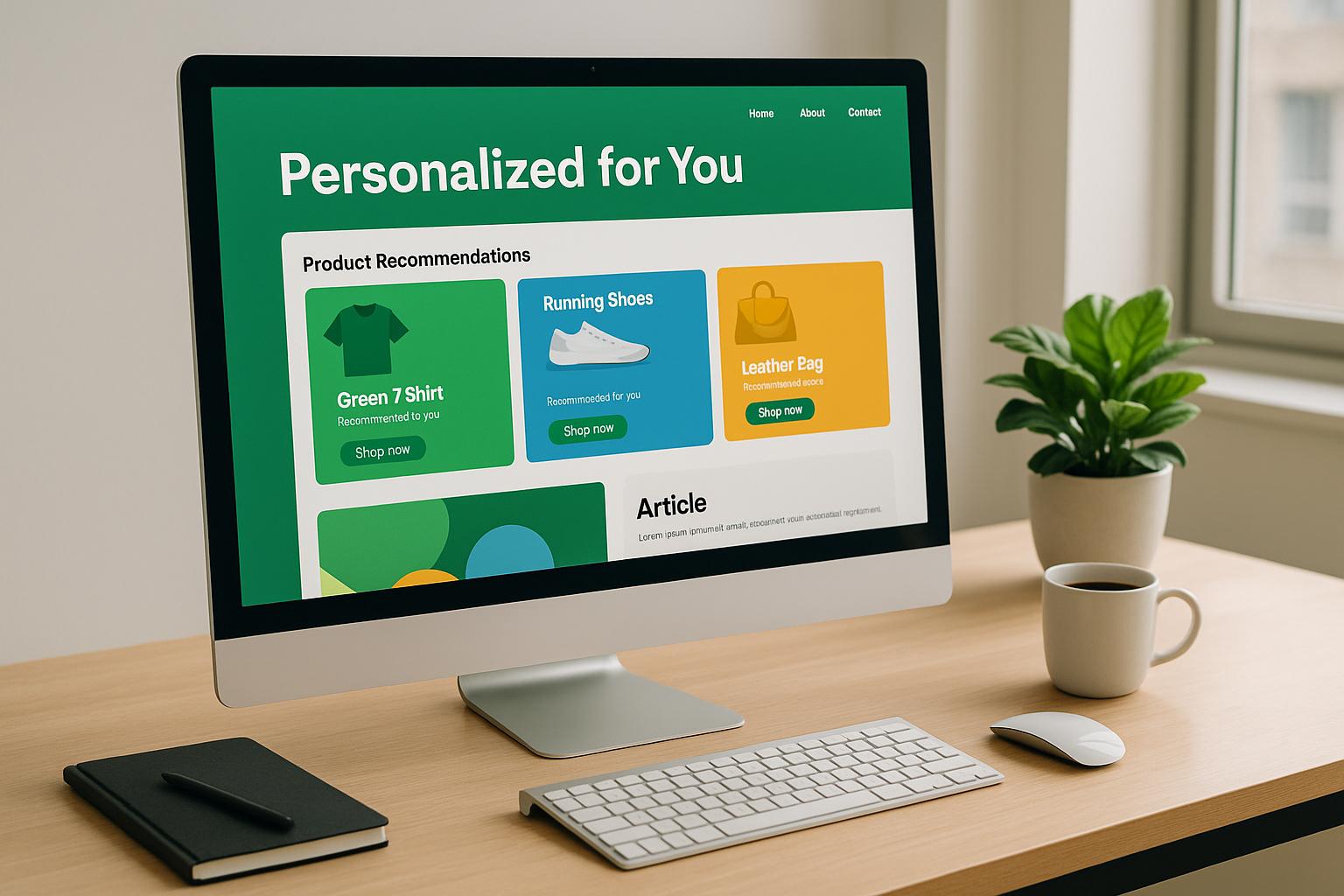Personalized experiences are no longer optional – they’re essential. In 2025, 71% of customers expect personalization, and businesses that excel at it see an 80% increase in spending. But which tools are worth your time and investment? Here’s a quick rundown of the top 10 personalization tools you need to know:
- Dynamic Yield: Advanced AI, predictive targeting, and seamless integrations. Best for large enterprises. Starts at $35,000/year.
- OptiMonk: Easy-to-use pop-ups and on-site messages. Perfect for small businesses. Free plan available; paid plans start at $29/month.
- Insider: AI-driven multi-channel personalization with measurable results. Custom pricing.
- VWO: Combines A/B testing with personalization. Great for mid-sized businesses. Starts at $393/month.
- Personyze: Affordable, real-time personalization with AI. Starts at $250/month.
- Bloomreach: AI-powered search and content personalization for enterprise e-commerce. Custom pricing.
- Barilliance: Focused on e-commerce with product recommendations and cart recovery. Starts at $250/month.
- Salesforce Interaction Studio: Enterprise-grade AI for real-time personalization. Starts at $108,000/year.
- AWS Personalize: Scalable AI for real-time recommendations. Pay-per-use pricing.
- Kreativa Inc: Full-service digital marketing with personalization. Custom pricing.
Quick Comparison Table
| Tool | AI Features | Integration Options | Pricing Range | Best For |
|---|---|---|---|---|
| Dynamic Yield | Predictive targeting, A/B tests | API-first, e-commerce platforms | $35K–$85K/year | Large enterprises |
| OptiMonk | Smart pop-ups, behavior tracking | Shopify, WordPress, CRMs | Free–$249/month | Small businesses |
| Insider | AI for multi-channel campaigns | CRM, analytics tools, e-commerce | Custom pricing | Retail, travel, media |
| VWO | A/B testing, smart traffic | Google Analytics, HubSpot, APIs | $393–$1,845/month | Mid-sized companies |
| Personyze | Real-time AI recommendations | APIs, CRM, e-commerce platforms | $250–$1,450/month | Budget-conscious businesses |
| Bloomreach | AI search, content personalization | Shopify, Databricks, Google DV360 | Custom pricing | Enterprise e-commerce |
| Barilliance | Cart recovery, product suggestions | Shopify, Magento, WooCommerce | $250+/month | Online retailers |
| Salesforce Interaction Studio | Einstein AI, journey orchestration | Salesforce ecosystem | $108K–$300K/year | Enterprises using Salesforce |
| AWS Personalize | Machine learning, real-time AI | AWS services, APIs | Pay-per-use | Developers, high-traffic sites |
| Kreativa Inc | Full-service AI marketing | WordPress, WooCommerce, Next.js | Custom pricing | Businesses seeking all-in-one solutions |
With personalization driving higher conversion rates and better customer retention, choosing the right tool for your business is critical. Dive into the full article for detailed insights on each platform.
Why Personalization is the Key to Business Success in 2025
1. Dynamic Yield
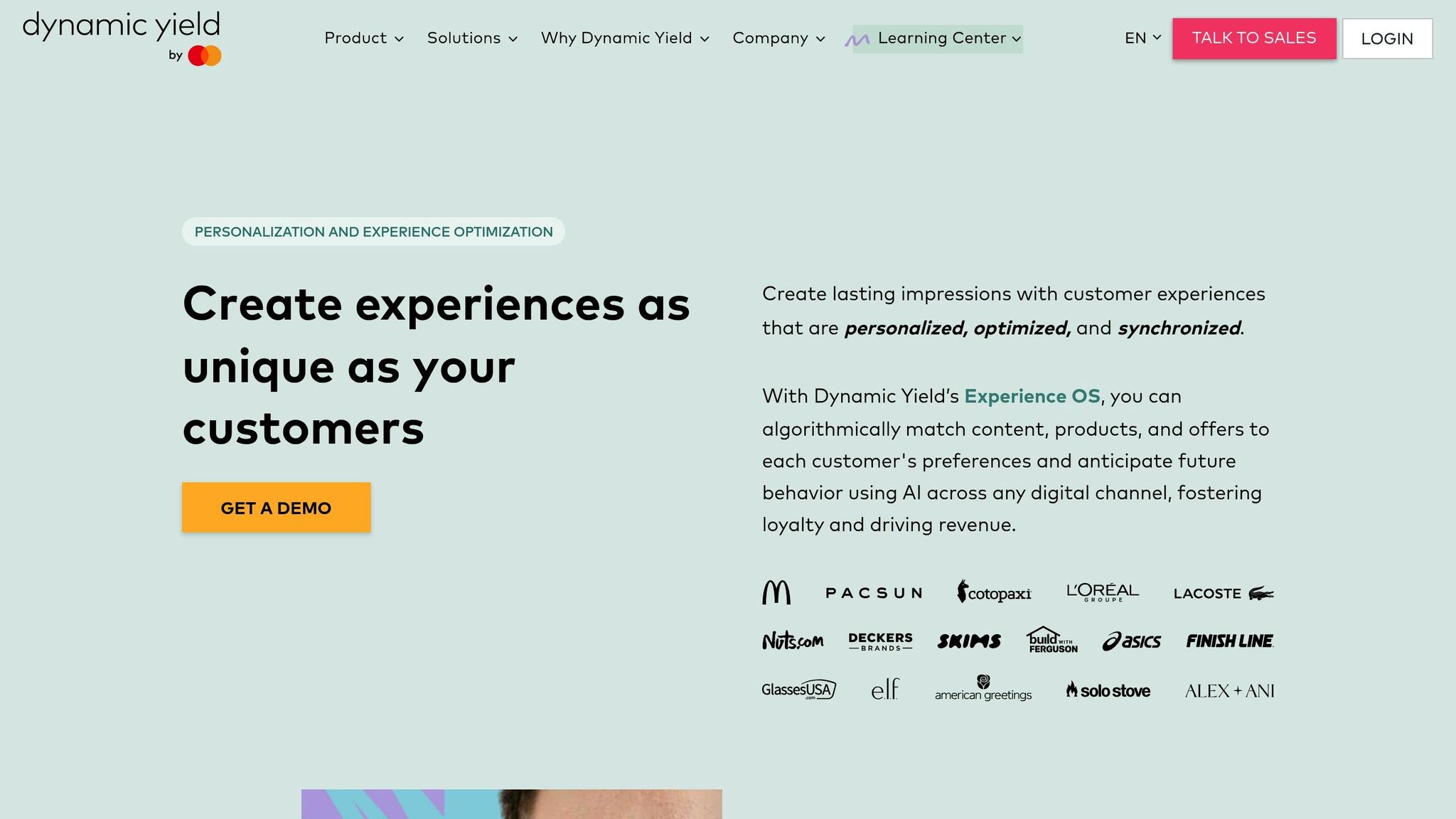
Dynamic Yield empowers businesses to create personalized experiences through its Experience OS and advanced AI technology. By tailoring content, products, and offers to individual preferences – and even predicting future behavior – it helps brands connect with their customers on a deeper level. A great example? e.l.f. Cosmetics used Dynamic Yield to customize their website menu based on users’ past shopping habits, which led to a 17.6% boost in conversion rates. Let’s break down what makes this platform stand out in AI, integration, and pricing.
AI and Machine Learning Capabilities
Dynamic Yield’s AI capabilities are powered by AdaptML, which uses machine learning techniques like natural language processing (NLP) and deep learning to deliver results. One standout feature, Shopping Muse, has been credited with generating up to 25% of revenue for some customers . The platform also offers tools like Predictive Targeting and Copywriter, which integrate with Stability.ai to deliver even greater levels of personalization.
Integration Flexibility
The platform is designed to integrate smoothly into existing tech ecosystems. It connects effortlessly with tools like data management platforms, eCommerce systems, email marketing services, and web analytics software – no major infrastructure overhaul required. Implementation is quick too; one user reported getting everything up and running in less than a month.
"Dynamic Yield enables us to develop and test high-impact experiences for our clients, and gives them flexibility to update and manage those experiences once they are proven effective."
- Brian Schmitt, Co-Founder at Surefoot
Dynamic Yield also features an Experience OS App Store, offering apps and extensions that allow businesses to scale their personalization efforts as their needs grow. This adaptability makes it a strong choice for companies with diverse requirements, though its pricing reflects its premium offerings.
Pricing Models
Dynamic Yield follows a subscription-based pricing model, with costs tailored to factors like user interactions, the number of websites, and the complexity of personalization. Pricing starts at $35,000 per year and can exceed $85,000, depending on the scale of implementation. While larger enterprises often see clear value in the investment, smaller businesses have noted concerns about affordability .
"DY meant a significant reduction in cost vs. the tools we were previously using, without affecting overall performance."
- Valter Roldão, Marketing Tech LATAM at Rocket Internet SE (Linio)
User reviews reflect mixed opinions on pricing: GetApp users rate its value for money at 3.0 out of 5, while SoftwareAdvice gives it an overall rating of 4.0 out of 5 .
Industry-Specific Use Cases
Dynamic Yield’s versatility shines across industries. Whether it’s retail, travel, media, or financial services, the platform tailors recommendations, pricing, and content to drive revenue and reduce costs. For example:
- Retail: Dynamic pricing and inventory optimization.
- Travel: Location-based offers for better customer engagement.
- Media: Enhanced content recommendations to keep audiences engaged.
- Financial Services: Personalized product offerings with compliance-friendly messaging.
"Dynamic Yield is generating additional revenue and saving IT resources."
- Zoltan M., Director of Marketing
The platform’s flexibility allows companies to start small – like basic website personalization – and then expand into more advanced applications across email campaigns, mobile apps, and beyond. This gradual approach makes it accessible for businesses looking to scale their personalization efforts over time.
2. OptiMonk
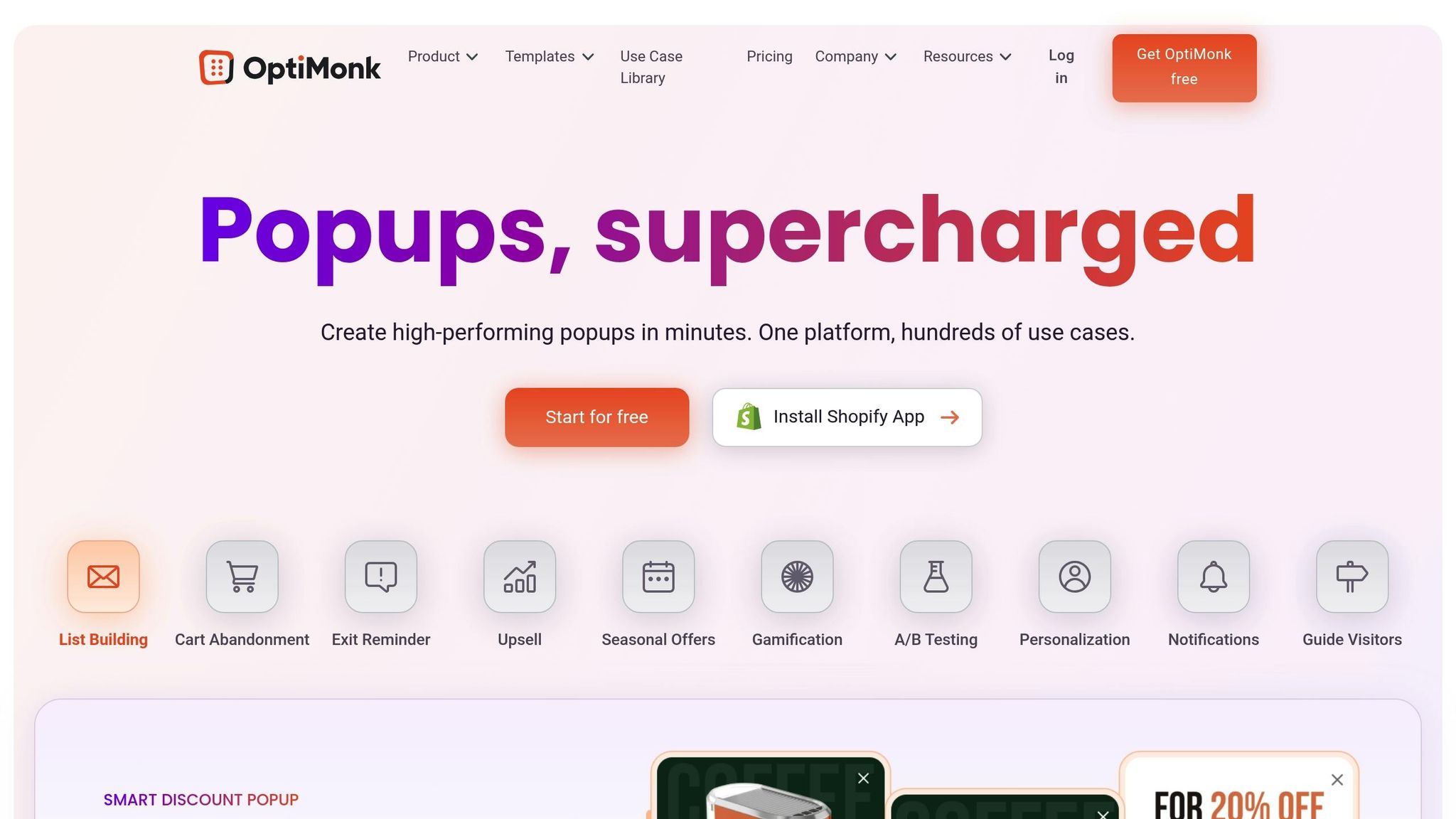
OptiMonk is an onsite retargeting platform designed to boost conversions with personalized pop-ups and on-site messaging. With its no-code setup, marketers can easily create tailored shopping experiences, while behavior-based tracking ensures these messages appear at the right moments for each visitor.
AI and Machine Learning Capabilities
By leveraging behavior-based tracking, OptiMonk identifies and showcases the most relevant deals and products to individual users. This approach replaces generic pop-ups with more tailored, engaging experiences.
Integration Flexibility
OptiMonk stands out for its seamless integration options, connecting with 47 different tools across multiple categories. Users have praised its integration capabilities, with ratings of 4.8/5 for overall integrations and a perfect 5.0/5 for third-party integrations.
| Category | Platforms |
|---|---|
| E-commerce Platforms | Shopify, WooCommerce, BigCommerce, 3dcart |
| Web Hosting | WordPress, Squarespace, Drupal, Weebly |
| Email Marketing | Mailchimp, Klaviyo, Aweber, ConvertKit |
| CRM Systems | Salesforce, HubSpot |
| SMS Marketing | SMSBump |
The platform’s integration with Salesforce Sales Cloud allows businesses to unify customer engagement strategies. Similarly, its connection with Mailchimp enables users to combine AI-driven email marketing insights with on-site personalization. For businesses with unique tech needs, OptiMonk offers custom integrations through Zapier and Webhooks, ensuring flexibility and adaptability.
"Nice combination of tools for lead generation and scarcity tactics that integrates with Zapier to any platform you use to nurture the leads." – COO, Marketing and Advertising
These integration capabilities make OptiMonk a versatile choice for businesses looking to streamline their tech stack.
Pricing Models
OptiMonk provides a tiered pricing structure designed to suit businesses of all sizes, starting with a free plan that includes essential features:
- Free Plan: $0/month for 1 domain, unlimited campaigns, 10,000 monthly pageviews, and access to all features.
- Essential: $29/month for 2 domains, unbranded campaigns, and 20,000 monthly pageviews.
- Growth: $99/month for 4 domains, unlimited campaigns, and access to all features.
- Premium: $249/month for 10 domains and access to all features.
- Master: Custom pricing tailored for enterprise needs, offering unlimited domains and dedicated account management.
Pricing scales based on the number of pageviews and domains, and all plans include unlimited user accounts.
Industry-Specific Use Cases
OptiMonk is particularly effective for lead generation businesses, offering dynamic forms that adapt to visitor behavior and traffic sources, driving better conversion rates. Its mobile-friendly customization ensures that campaigns perform seamlessly across devices, making it a powerful tool for personalization.
3. Insider
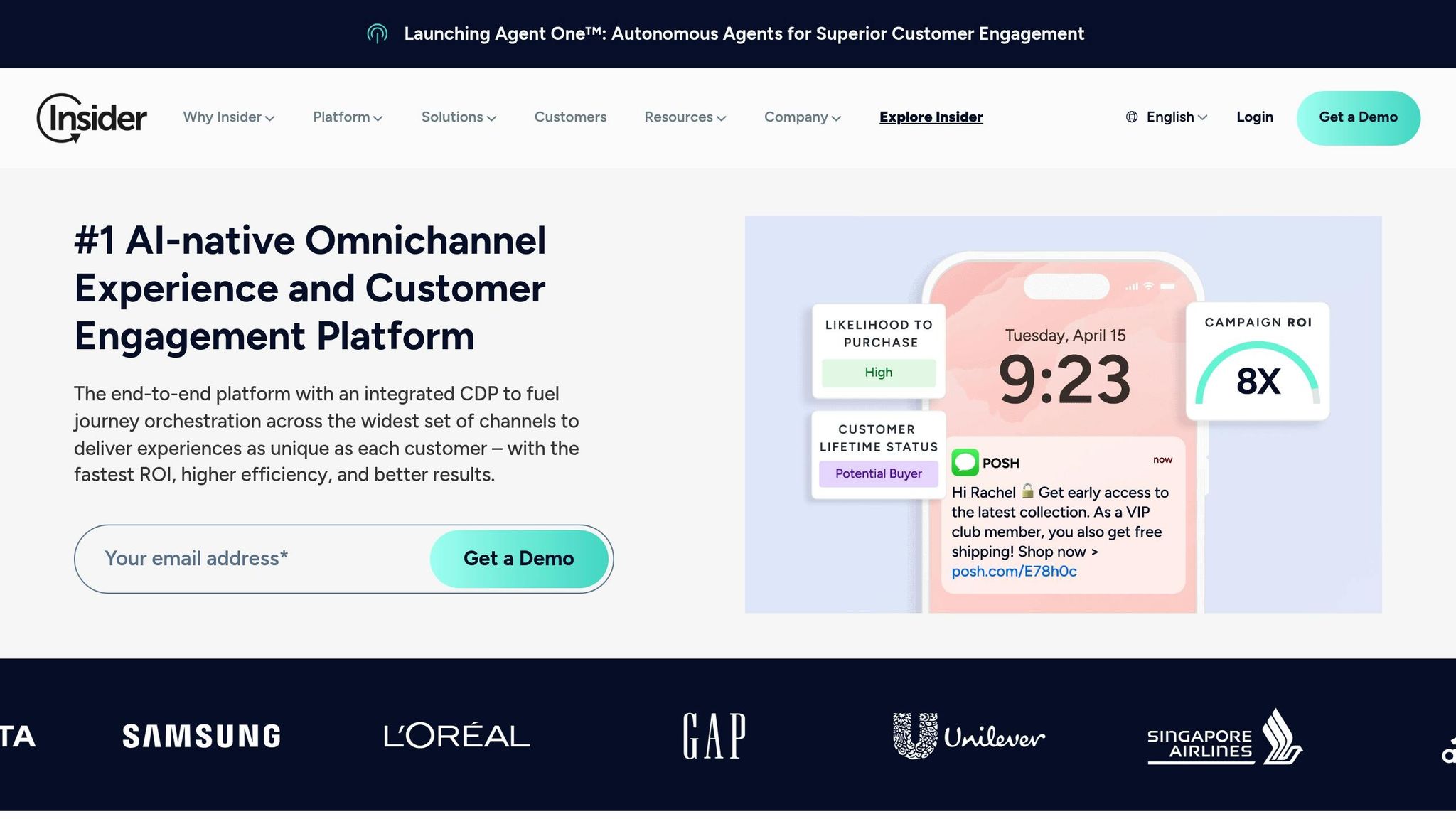
Insider is a personalization platform designed to deliver targeted, multi-channel experiences by collecting and analyzing customer data.
AI and Machine Learning Capabilities
Insider’s Sirius AI toolkit taps into billions of data points to provide advanced personalization. The platform uses AI to automate campaigns, speed up launches with generative AI, and analyze real-time customer behavior. This results in personalized product recommendations and optimized email and SMS content.
The results speak for themselves. Philips saw a 40.11% boost in conversion rates and a 35% increase in average order value. Slazenger achieved a 700% jump in customer acquisition and a 49× return on investment within just eight weeks. Dover Saddlery added $1.7 million in incremental revenue through personalized storytelling features, while Lenovo reduced cart abandonment rates by over 10% using tailored web push notifications.
These AI-driven tools provide the backbone for seamless integration with other platforms.
Integration Flexibility
Insider excels in integration, connecting with over 100 platforms and tools like Salesforce, HubSpot, Shopify, Google Analytics, Segment, Magento, BigCommerce, and Microsoft Dynamics. Businesses can continue using their existing Customer Data Platforms (CDPs) while enhancing them with Insider’s personalization and automation features. Insider’s Actionable CDP brings together data from online and offline sources – such as content management systems, APIs, analytics tools, and point-of-sale devices – giving businesses a 360-degree view of their customers.
This integration capability helps businesses achieve measurable results across diverse industries.
Industry-Specific Use Cases
Insider has become a go-to platform for top brands in industries like e-commerce, retail, online travel, media, and banking. Feedback from clients highlights its impact:
- MCoBeauty (Australia): Reported better customer engagement and higher conversions during both regular and promotional periods.
- Basico.com (Brazil): Experienced substantial revenue growth through advanced CRM and conversion rate optimization.
- EHPlabs (Australia): Praised the smooth integration process that connected all their Shopify stores.
- Avo eShop (Hong Kong): Successfully integrated its website and insurance product portfolio, combining website campaigns with web push notifications and email, generating $4,000 in revenue.
- Eveshop Dev (Turkey): Used Insider’s website templates, Instagram story templates, and site search solutions to create interactive experiences that improved product discovery and drove conversions.
Insider’s ability to adapt to different industries and deliver measurable outcomes makes it a standout choice for businesses worldwide.
4. VWO (Visual Website Optimizer)
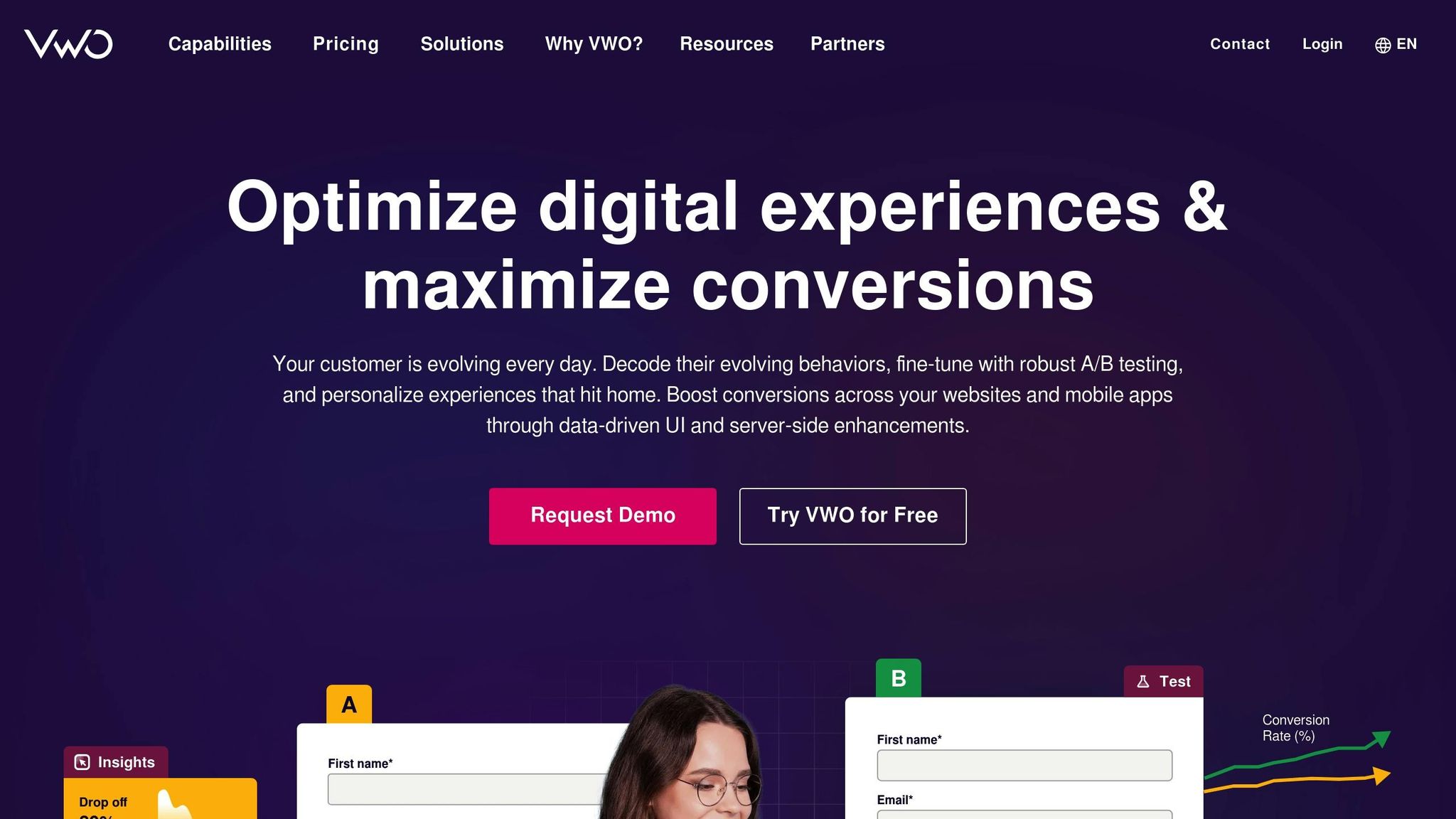
VWO is a powerful platform that combines A/B testing with AI-driven personalization, making it a favorite among over 599,000 websites. Designed to boost conversions, it brings together data-driven insights and advanced testing capabilities to optimize user experiences effectively.
AI and Machine Learning Capabilities
At the heart of VWO’s AI features is VWO Copilot, an intelligent assistant that analyzes user behavior, offers actionable insights, and suggests experiments or personalized experiences. It simplifies the optimization process by transforming natural language suggestions into tests and tailored user interactions.
"VWO Copilot takes over the heavy lifting of optimization – suggesting what to test, creating variations, and revealing key insights – so your team can focus on making strategic decisions that drive results."
Other standout features include:
- VWO Personalize: Enhances user data to deliver targeted experiences.
- Smart Traffic: Automatically directs visitors to the best-performing pages.
- Attention Insight: Predicts design focus areas with 90% accuracy.
- Generative AI Tools: Helps refine content variations for better performance.
Integration Flexibility
VWO is built to work seamlessly with various marketing and analytics tools, ensuring smooth data flow and enhanced functionality. For instance, it integrates with Google Analytics 4, allowing users to analyze experiment results directly. It also connects with HubSpot, enabling teams to combine CRM data with testing campaigns, and works with Segment for real-time, two-way data syncing.
| Integration Category | Available Platforms |
|---|---|
| Analytics | Google Analytics 4, Adobe Analytics, Amplitude, Matomo, Piano Analytics, Piwik PRO |
| CRM | HubSpot, Salesforce |
| E-commerce | BigCommerce, Shopify, Salesforce Commerce Cloud, Magento |
| Data Management | Segment, Rudderstack, Tealium, mParticle |
| Session Recording | Fullstory, Glassbox, Contentsquare |
For businesses with specific needs, VWO provides robust APIs, enabling teams to create custom dashboards or integrations tailored to their workflows.
"Using VWO, we are able to swiftly launch A/B tests, tackle data trends and customer problems. We merge VWO reports with our tools for complete insights into user behavior." – Molly Parker, Sr. Director, Site Content & Creative Operations
Pricing Models
VWO offers flexible pricing plans based on monthly traffic, catering to businesses of all sizes:
- Starter Plan: Free for websites with up to 50,000 monthly visitors.
- Growth Plan: Starts at $393/month (Testing) or $924/month (Feature Experimentation) for up to 250,000 visitors.
- Pro Plan: Begins at $1,214/month (Testing) or $1,845/month (Feature Experimentation) for up to 1 million visitors.
Additional features like Targeting Plus, Reporting Plus, and Security Plus are available as fixed-price add-ons.
"VWO is a reliable A/B testing tool that I’ve been using for mid-sized clients for about 15 years… It’s more user friendly and affordable than Adobe and Optimizely. But it’s just as powerful." – Theresa F., CRO Program Manager, Marketing and Advertising
With an average rating of 4.0 out of 5 from 42 reviews, VWO has earned praise for its balance of functionality, ease of use, and affordability.
5. Personyze
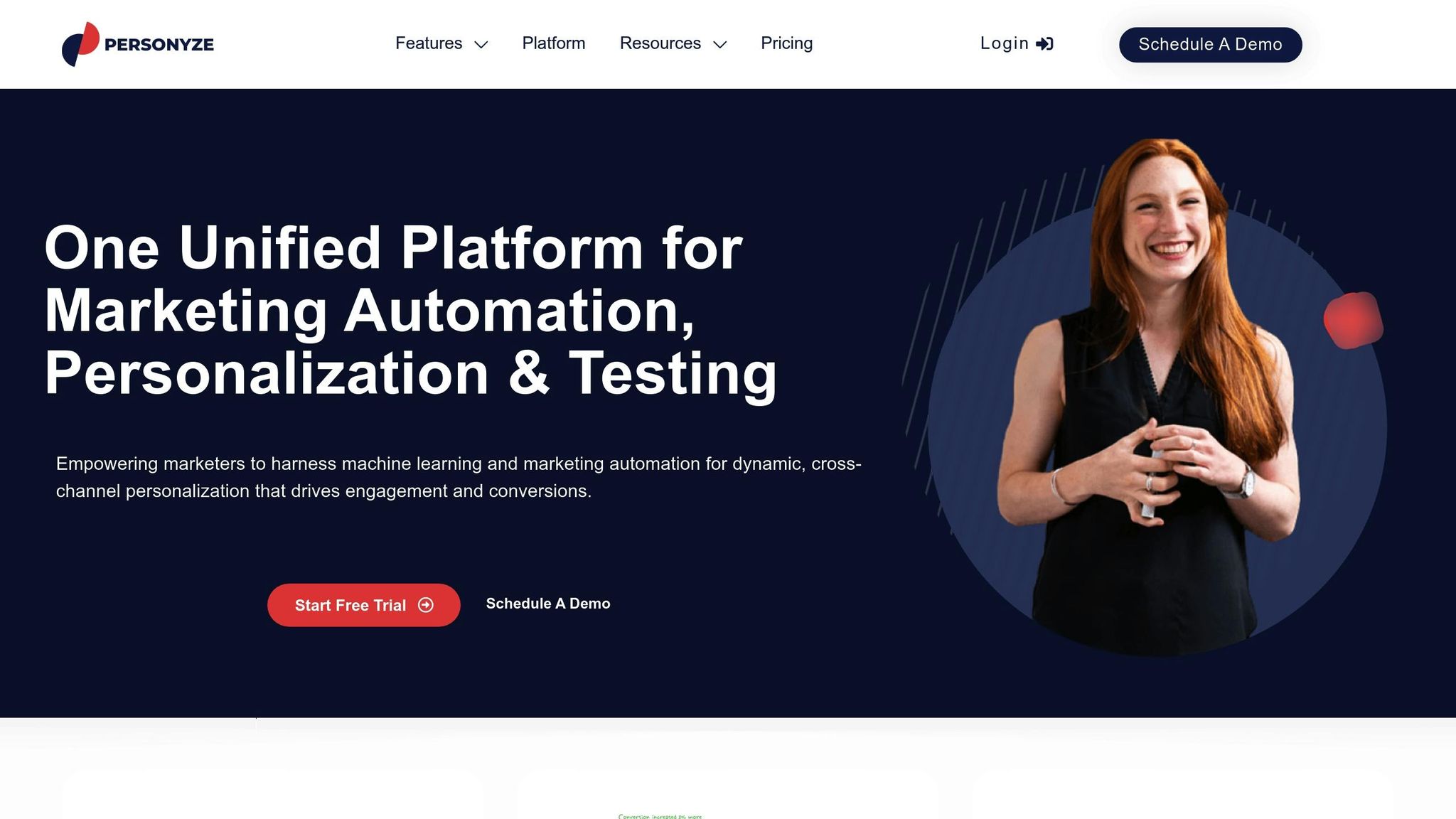
Personyze is a personalization platform that uses AI to create customized website experiences. With a 4.6 out of 5 rating on GetApp and 94% positive reviews, it stands out for its robust features and highly-praised customer support.
AI and Machine Learning Capabilities
Personyze combines AI with real-time visitor data to deliver personalized recommendations. Its AI engine tracks user behavior and generates tailored product and content suggestions that evolve based on visitor interactions. Unlike basic demographic targeting, the platform analyzes over 70 data variables to craft personalization rules that adapt to user behavior, preferences, and contextual factors in real time.
Integration Flexibility
Personyze acts as a central hub for transforming data from multiple sources into personalized marketing actions. It integrates with popular tools like HubSpot, Salesforce, and Segment, along with e-commerce platforms, CRM systems, and analytics tools[48,49]. Data can be imported through CSV uploads, Google Sheets, REST API, or JavaScript SDK, and the platform offers APIs for seamless integration.
A notable example is HomeAway.com, which used Personyze to streamline its marketing efforts. Trey Ogier from HomeAway.com highlighted the platform’s impact:
"With Personyze, our teams around the globe can now deliver new targeted promotions and messages within hours instead of weeks. Moreover, our local marketing teams around the world are empowered to manage their own marketing campaigns without the involvement of our core development team!"
Personyze also integrates with ABM tools like 6sense, Demandbase, and Clearbit, and offers SDKs for iOS and Android apps, making it a versatile solution for businesses of all sizes[48,49].
Pricing Models
Personyze offers pricing plans designed to suit various business needs:
| Plan | Monthly Price | Annual Price | Monthly Pageviews | Domains | Support Hours |
|---|---|---|---|---|---|
| Free | $0 | $0 | 5,000 | 1 | Email only |
| Lite | $250 | $225 ($2,700/year) | 100,000 | 2 | 2 hours/month |
| Power | $450 | $412 ($4,950/year) | 1,000,000 | 5 | 5 hours/month |
| Enterprise | $1,450 | $1,305 ($15,660/year) | 10,000,000 | 10 | 10 hours/month |
All paid plans include 24/7 support and expert assistance. Additionally, most plans come with a 30-day money-back guarantee and the option to upgrade or downgrade as needed.
Industry-Specific Use Cases
Personyze is used across various industries. For instance, PalmBeach Jewelry leverages the platform for personalized product recommendation emails, driving higher conversion rates through targeted messaging. Similarly, Sockprints.com has enhanced customer engagement on its website thanks to Personyze’s personalization features.
Customer support is frequently praised by users. Geni Genson P. from Xcite.com shared their experience:
"It’s an all in one tool that delivers impeccable performance. Support is AMAZING! played a big role in our success."
The platform’s 4.5 out of 5 rating for value for money underscores its ability to deliver results while keeping costs competitive.
6. Bloomreach

Bloomreach is a platform designed for businesses aiming to deliver personalized customer experiences. By combining AI-powered insights with flexible integration options, it helps companies create meaningful interactions across various channels. Central to its capabilities is Loomi AI, which drives personalization at scale.
AI and Machine Learning Capabilities
At the heart of Bloomreach’s technology is its Loomi AI platform, which analyzes customer behavior to predict intent. This allows businesses to provide real-time product recommendations and targeted offers. By drawing on diverse datasets, it delivers personalization tailored to each user’s context.
Bloomreach Discovery takes this a step further with its GenAI-powered core. It interprets the context behind user search queries, moving beyond basic keyword matching to offer highly relevant results. This AI-driven approach not only anticipates customer needs but also helps businesses address potential issues like churn by enabling proactive strategies.
The platform’s impact is evident in real-world results. For example:
- Yves Rocher experienced 17.5× more clicks and an 11× increase in purchase rates on recommendations.
- The Thinking Traveller saw a 33% rise in inquiries.
- TFG achieved a 35.2% jump in conversion rates and a 39.8% boost in revenue during Black Friday.
Integration Flexibility
Bloomreach is built to work seamlessly with other tools, offering pre-built connectors, APIs, and webhooks. It integrates with over 30 products and has earned a 4.3 out of 5 rating on Gartner Peer Insights.
The platform is continually expanding its integration ecosystem. Recent efforts include deeper integrations with Shopify, Databricks, and Google DV360, along with enhancements to its Omniconnect+ feature, which handles large volumes of real-time data from third-party platforms. For businesses prioritizing security, Bloomreach Engagement provides features like static IPs, TLS/HTTPS, and VPN options.
Highlighting its commitment to integration, Bloomreach partnered with Captain Up in May 2025. This collaboration offers iGaming companies unified CRM, gamification, and loyalty tools, enabling real-time personalization and seamless omni-channel experiences.
That said, some integrations may require custom development. As one Gartner Peer Insights reviewer explained:
"Bloomreach Content offers a flexible and scalable CMS that is great for personalisation and omnichannel experiences. However, it comes with a steep learning curve, occasional UI inconsistencies, and limited debugging tools for testers. Strong API capabilities but require thorough testing to avoid unexpected errors."
These integration features also contribute to Bloomreach’s pricing flexibility.
Pricing Models
Bloomreach uses a modular, usage-based pricing model. This allows businesses to start with specific features and expand as their needs grow. Costs are determined by factors like the number of customers served, product catalog size, and event volume (e.g., emails or SMS messages sent). Pricing is based on annual subscriptions, with discounts for longer-term commitments. Notably, Loomi AI is included at no extra charge, adding significant value to the platform.
This flexible approach ensures that businesses of all sizes can scale their personalization efforts as needed.
Industry-Specific Use Cases
Bloomreach provides tailored solutions for various industries, helping companies achieve measurable results. Its client base spans sectors like beauty (e.g., Yves Rocher), travel (e.g., The Thinking Traveller), and fashion retail (e.g., TFG). The platform’s ability to deliver personalized experiences often yields a 5–8× return on marketing spend.
To further support its clients, Bloomreach advisors work closely with businesses to identify the best product features and pricing options. This ensures companies can maximize the platform’s value while keeping track of key performance metrics.
sbb-itb-edfb666
7. Barilliance
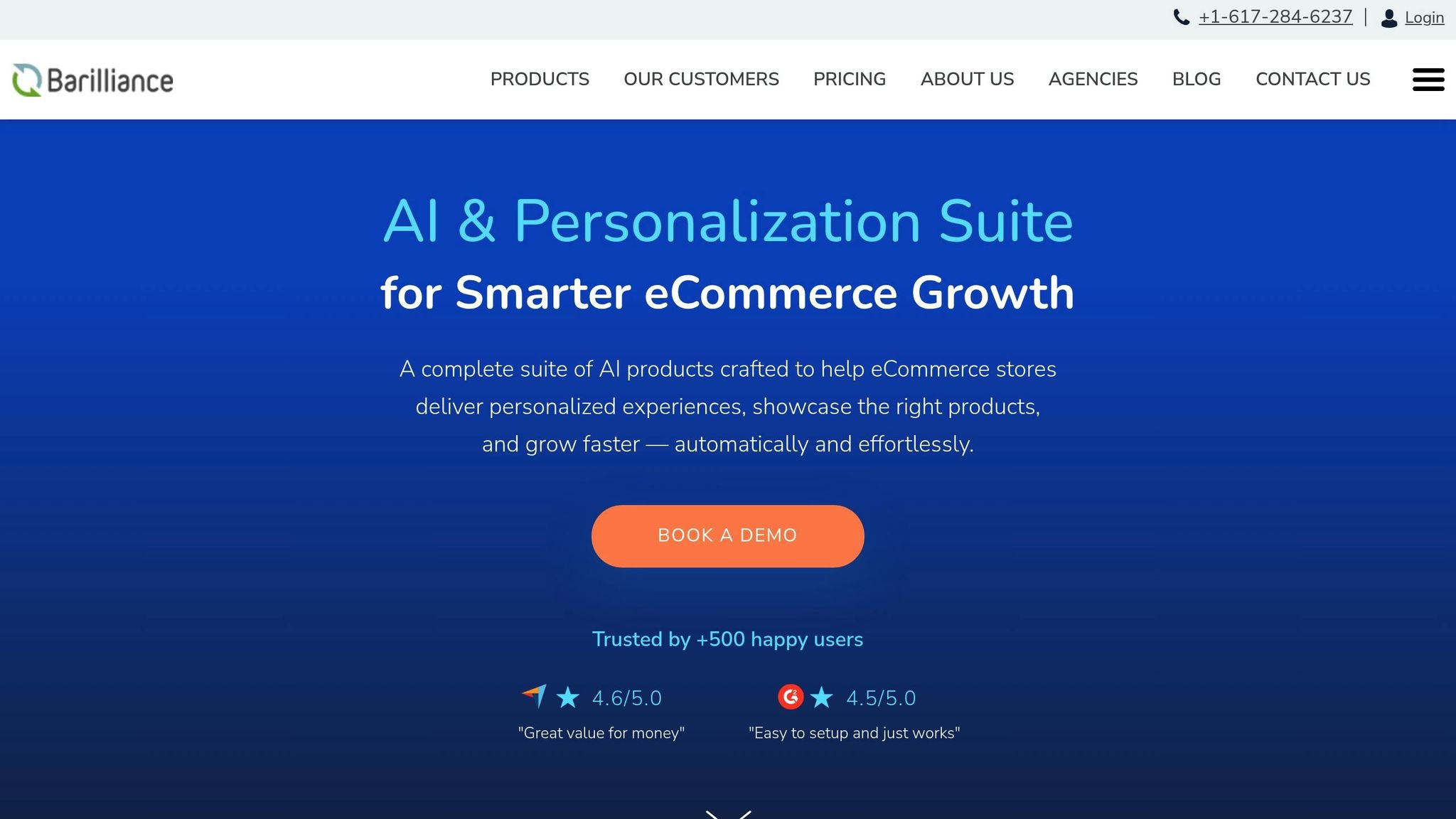
Barilliance stands out as a platform that uses AI to create personalized shopping experiences for e-commerce businesses. By offering targeted product recommendations and enhancing customer engagement through machine learning, it provides a straightforward way for businesses to improve online sales. Let’s dive into how its AI-driven features work to deliver precise recommendations.
AI and Machine Learning Capabilities
Barilliance uses AI to analyze user behavior and select the best recommendation algorithm for each visitor. It gathers detailed data – like product views, items added to the cart, purchase history, search queries, and static product details (pricing and availability) – to ensure every recommendation feels relevant. For instance, new visitors might see best-sellers, while returning customers get tailored suggestions. Retailers can also fine-tune recommendations by applying their own merchandising rules, such as prioritizing full-priced items or avoiding low-stock products.
Here’s why it’s so impactful: product recommendations contribute to as much as 31% of e-commerce revenue. On average, 12% of total sales can be linked directly to these engines. Even a single interaction with a recommendation can drive a 369% increase in order value, while conversion rates rise by 288% after one engagement.
"Applying data science to the retail world for over 10 years, Barilliance offers retailers powerful machine learning capabilities through an easy to use interface."
– Barilliance
Integration Flexibility
Barilliance makes integration simple. It works with major e-commerce platforms and email marketing tools like Salesforce, Oracle NetSuite, and SAP Hybris, requiring only a single static code snippet for setup. A verified user on Gartner Peer Insights shared:
"Barilliance already has great integrations with leading e-commerce platforms and email marketing solutions like Salesforce, Oracle NetSuite, SAP Hybris etc. and thus offers a quick setup and onboarding for projects."
– Verified User, Gartner Peer Insights
While some users suggest expanding compatibility with additional platforms, Barilliance still earned a perfect 5.0 out of 5 for ease of integration using standard APIs and tools.
Pricing Models
Barilliance offers flexible month-to-month plans starting at $250. Businesses can choose individual features or opt for the full personalization suite, tailoring the service to their needs. With a strong 4.7 out of 5 rating for value for money based on 18 reviews, it’s a popular choice for e-commerce businesses of all sizes. However, Barilliance doesn’t provide a free trial or free version, focusing instead on delivering immediate results through its paid plans.
Industry-Specific Use Cases
Barilliance is particularly effective for online retailers looking to combat cart abandonment, with its recommendations helping reduce this issue by up to 4.35%.
One notable success story comes from LG Spain. Juan Larrauri, Digital Marketing Manager at LG Spain, shared:
"We were looking for a tool to manage automatically our merchandising needs. But we found more than that in Barilliance."
– Juan Larrauri, LG Spain
Additionally, the platform extends its personalization capabilities beyond websites by integrating recommendations into email campaigns, offering retailers another way to connect with their customers.
8. Salesforce Interaction Studio (Evergage)
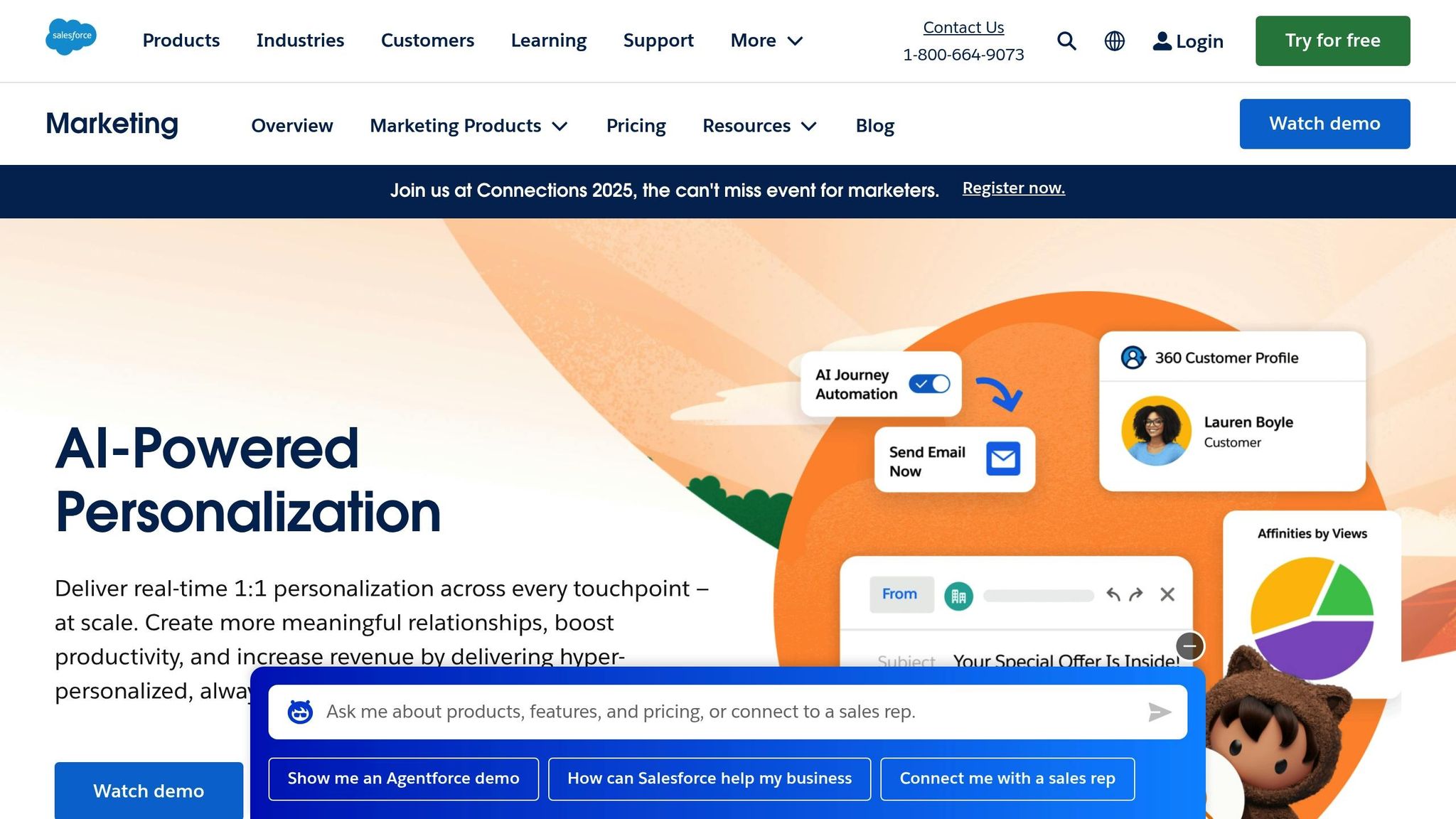
Marketing Cloud Personalization brings enterprise-grade AI to the forefront of website personalization. By merging Salesforce’s powerful CRM data with advanced machine learning, it creates highly targeted customer experiences. With 92% of customers expecting personalization and 80% of B2C consumers valuing the experience as much as the products themselves, this tool meets a pressing demand in today’s business landscape. Let’s dive into its AI features, integration capabilities, and pricing.
AI and Machine Learning Capabilities
Marketing Cloud Personalization leverages AI to predict what customers want and delivers tailored content in real time. Its Einstein Recipes feature uses algorithms to analyze customer profiles and craft experiences that feel custom-made.
"A personalization engine is a kind of technology solution that ingests customer engagement and profile data, then – using machine learning and AI – determines relevant messages, segmentation, and content for each customer, based on their preferences and affinities." – Salesforce
This AI adapts as users browse, continuously refining recommendations to align with their behavior.
For example, in financial services, the platform updates a prospect’s profile instantly based on their online activity. If someone explores specific financial products, the system ensures they receive timely and relevant emails or website suggestions tailored to their interests.
Integration Flexibility
The platform integrates seamlessly with Adobe and other Salesforce products, enabling real-time personalization and messaging. However, setting up the full suite may require extra time and technical expertise, especially when linking multiple studios.
Pricing Models
Marketing Cloud Personalization offers three pricing tiers to suit different business needs:
| Edition | Annual Price | Key Features |
|---|---|---|
| Growth | $108,000/org/year | Web and email personalization, product & content recommendations, experimentation |
| Premium | $300,000/org/year | Web, email, and mobile app personalization, advanced product recommendations |
| Salesforce Personalization | Custom quote | Comprehensive suite with Agentforce AI decision-making and objective-based recommendations |
The Growth edition is ideal for businesses focusing on web and email personalization. Premium expands these capabilities to mobile apps, while Salesforce Personalization offers the most advanced features, including AI-driven decision-making.
For enterprises that rely heavily on CRM integration, this platform enhances and complements their personalization strategies.
Industry-Specific Use Cases
Marketing Cloud Personalization shines in industries with intricate customer journeys. Financial services, for instance, benefit from its ability to track behavior across multiple touchpoints and adjust messaging dynamically.
"Marketing Personalization is the practice of using data to deliver relevant and tailored brand messages to specific audiences." – Salesforce
This tool addresses a critical gap, as fewer than 25% of marketers feel fully confident in their ability to deliver the right message at the right time through the right channel. By aligning personalization efforts with business goals, companies can create targeted strategies that directly address specific challenges and opportunities.
9. AWS Personalize
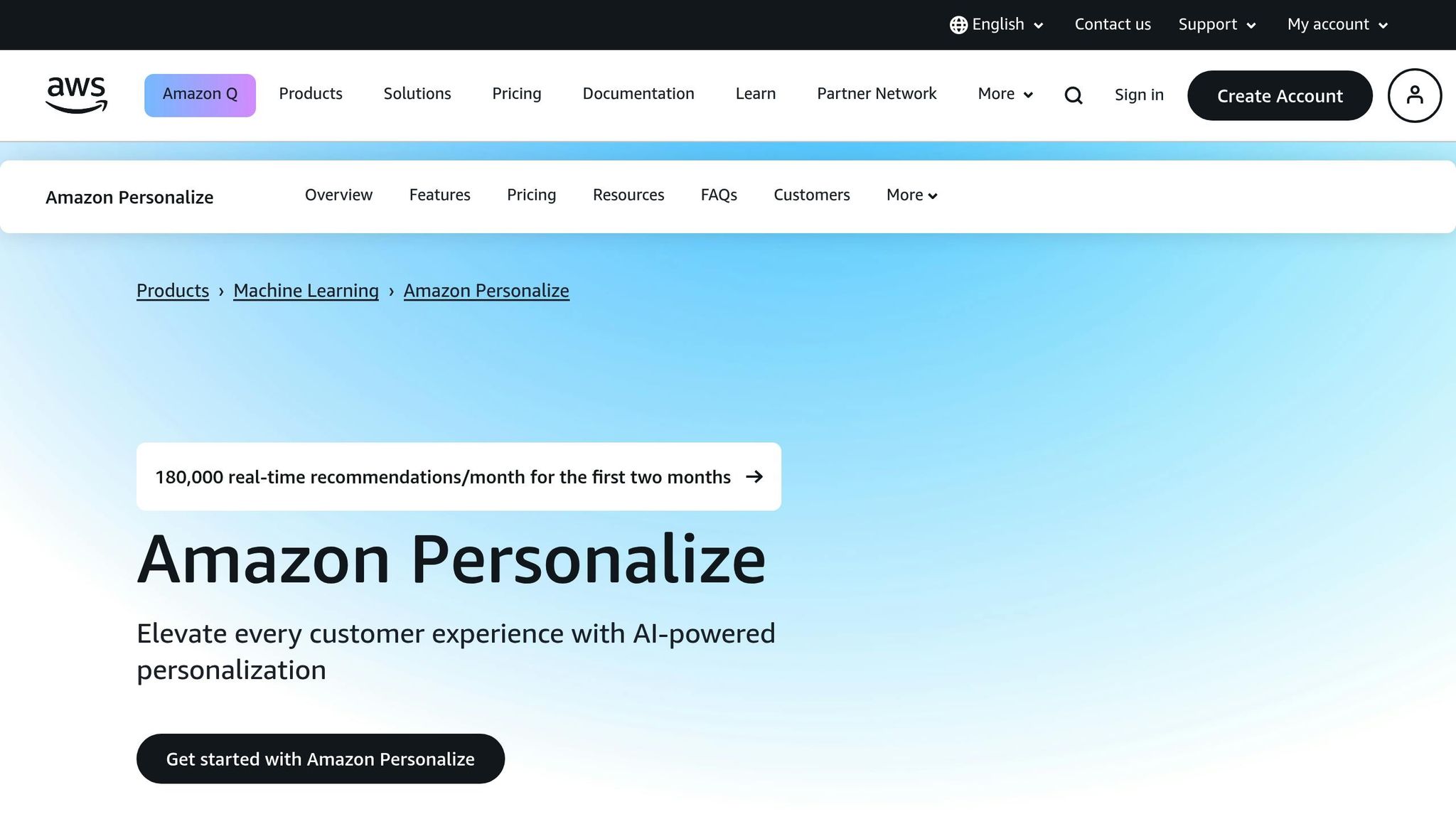
AWS Personalize brings advanced AI to businesses, offering real-time recommendations tailored to user behavior on websites and apps. By leveraging sophisticated algorithms, it processes billions of interactions and millions of items, making it a go-to solution for high-traffic platforms that demand scalable personalization systems.
AI and Machine Learning Capabilities
AWS Personalize stands out with its ability to seamlessly integrate into existing systems while delivering a range of AI-powered features. These include user personalization, personalized rankings, similar item recommendations, personalized search, user segmentation, trending now, and next best action. Together, these features ensure precise, user-specific experiences.
What sets AWS Personalize apart is its real-time adaptability. Unlike static systems, it continuously refines its understanding of user preferences as they interact with content, ensuring recommendations remain relevant throughout a session.
"Amazon Personalize helps you elevate the customer experience with AI-powered personalization."
The platform also uses contextual intelligence, factoring in elements like device type, time of day, and location to fine-tune recommendations. Additionally, it supports unstructured text processing, enabling it to analyze content descriptions, reviews, and other text-based data for more accurate suggestions.
Integration Flexibility
AWS Personalize offers flexible API integration, making it easy to implement across various platforms and channels. Developers can use its two main inference APIs – getRecommendations and getPersonalizedRanking – to address specific use cases.
One standout feature is its integration with OpenSearch, which enhances personalized search capabilities. For example, in tests using the Retail Demo Store dataset, a male user searching for "Grooming" products saw a dramatic improvement in results. With a personalization weight of 0.3, a Premium Men’s Razor moved from rank 6 to rank 2. Increasing the weight to 0.8 pushed four male-oriented grooming products to the top.
AWS Personalize also connects seamlessly with AWS Pinpoint for outbound communication via email, SMS, and mobile push notifications. It works with SageMaker Data Wrangler and Amazon Bedrock for advanced data preparation and generative AI applications. Furthermore, its incremental bulk data imports ensure that recommendation quality improves as new data becomes available.
Industry-Specific Use Cases
AWS Personalize’s capabilities translate into tangible results across industries. For instance, Warner Bros. Discovery used it to enhance cross-portfolio promotions on platforms like TBS, TNT, TruTV, and Adult Swim. This resulted in over 25,000 unique clicks, a 14% boost in total engagement, and a 12% increase in cross-brand engagement.
"With Amazon Personalize we were able to build and train a real-time recommendation engine POC within two days… Amazon Personalize has been instrumental in showcasing content that our fans want to see more effectively across our various brands." – Don Browning, VP Cloud Architecture, WBD
Seven West Media integrated AWS Personalize into their 7plus streaming platform, serving 13.5 million registered users. The results? A 48% increase in minutes viewed and three times the viewer interactions compared to their previous manually curated approach.
In the travel sector, Traveloka achieved a 13% higher click-through rate compared to third-party solutions and a 66% improvement over in-house models. Retailers have also seen impressive results: Cencosud reported a 600% increase in click-through rates and a 26% rise in average order value, while GrocerApp saw a 17% boost in average order value. Fitness brand Equinox used AWS Personalize to customize member experiences in its Equinox+ app, leading to a 92% increase in engagement with carousel content.
10. Kreativa Inc
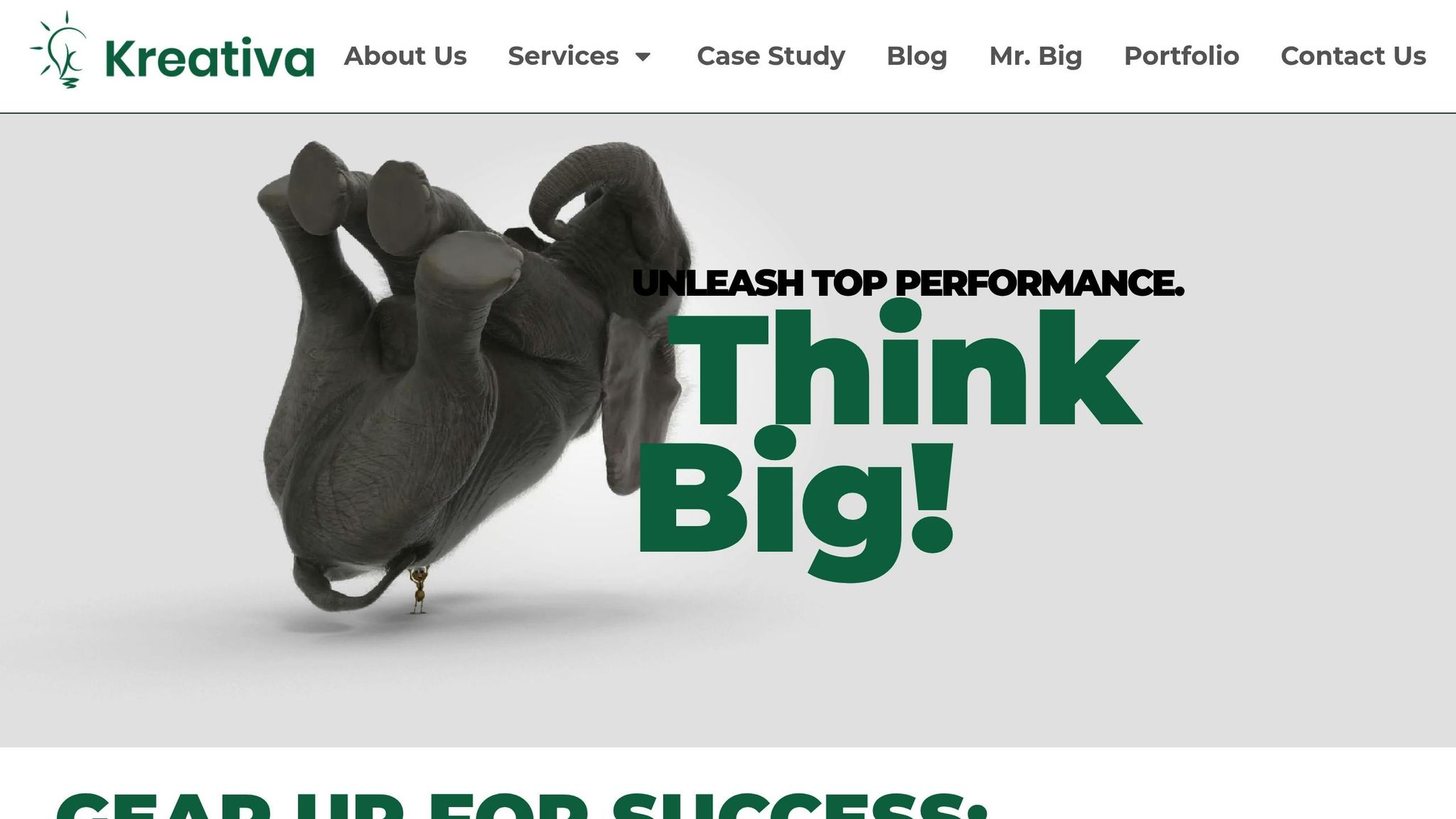
Wrapping up our top 10 is Kreativa Inc, a company that excels at blending cutting-edge digital marketing with personalized website experiences. Founded by Luis Concha and John Trainor, Kreativa Inc focuses on creating tailored digital interactions that not only enhance user engagement but also drive tangible business growth. By combining expertise in digital marketing with operational efficiency, they help businesses achieve smarter workflows and increased revenue.
What sets Kreativa Inc apart is its ability to weave personalization into every aspect of digital marketing. From SEO and PPC advertising to conversion rate optimization, marketing automation, and chatbot development, they create a cohesive ecosystem that elevates every user interaction.
Seamless Integration and Technical Expertise
Kreativa Inc’s technical capabilities make it easy to integrate their solutions into modern web development environments. Their team utilizes core web technologies like HTML, CSS3, and JavaScript, along with advanced libraries, to deliver smooth, interactive experiences tailored to individual users. They also excel in implementing headless CMS solutions using Next.js and custom WordPress integrations. For e-commerce, they rely on WooCommerce, a platform that holds approximately 30% of the market share.
Their agile creative process ensures visually appealing and functional designs without disrupting existing workflows. Using top-tier design and project management tools, they deliver seamless integration and user-friendly results.
"From the very beginning, it was clear that we were dealing with top-notch professionals. Their approach to work can be described as robotically precise and militarily disciplined, with the entire team optimized for delivering results. Working with them was an absolute pleasure – we were impressed by their work, dedication, and creative solutions."
- Domagoj Ćaćić, CEO, Do-bra d.o.o.
This level of technical flexibility and precision translates into noticeable performance improvements across various industries.
Tailored Pricing Options
Kreativa Inc offers three customizable pricing tiers to suit different business needs:
- Basic Plan: Includes core services like SEO, social media marketing, and content marketing, along with essential personalization features.
- Advanced Plan: Adds PPC advertising, conversion rate optimization, and marketing automation for more advanced personalization.
- Premium Plan: Unlocks their full suite of services, including chatbot development, in-depth analytics, and affiliate program development, for businesses seeking highly sophisticated personalization.
Delivering Personalized Results
Kreativa Inc understands that personalization is no longer optional – 63% of consumers now expect it as a standard feature. Moreover, personalized experiences have been shown to increase conversions by 15%. Their process begins with collecting detailed data on user demographics, behaviors, and preferences. This information is then used to create audience segments, enabling targeted personalization that feels relevant and engaging rather than intrusive.
Continuous testing and analysis play a key role in their strategy. By refining their approach based on real user data and behavioral trends, Kreativa Inc ensures their personalization techniques remain effective and aligned with evolving consumer expectations.
Through their technical expertise and data-driven strategies, Kreativa Inc delivers personalized solutions for e-commerce, B2B, and content-driven websites. Their approach balances innovation with a human touch, setting a high standard for personalized marketing as we move further into 2025.
Feature Comparison Chart
Aligning a tool’s features with your business needs is key to maximizing ROI. As highlighted earlier, each tool brings its own strengths and limitations, which can significantly impact how well it fits your specific goals. With 92% of businesses using AI-driven personalization to fuel growth, it’s essential to choose a platform that balances features, integrations, and pricing tailored to your industry.
Here’s a quick comparison of the tools discussed:
| Tool | AI Features | Integration Options | Pricing Range | Best For |
|---|---|---|---|---|
| Dynamic Yield | Traditional AI recommendations, predictive segmentation, automated A/B testing | API-first architecture, major e-commerce platforms, CMS integration | Custom pricing | Enterprise retailers, large-scale e-commerce |
| OptiMonk | Smart pop-up triggers, behavioral targeting, exit-intent detection | WordPress, Shopify, Magento, Google Analytics | $29-$149/month | Small to medium businesses, lead generation |
| Insider | Traditional, Conversational, and Generative AI | Cross-channel integration, automatic data collection, CRM sync | Custom pricing | Retail, fashion, apparel industries |
| VWO | A/B testing automation, predictive analytics, smart traffic allocation | WordPress, Shopify, custom APIs, analytics platforms | Starts at $199/month | Mid-market companies, conversion optimization |
| Personyze | Machine learning recommendations, behavioral triggers, content optimization | Any CMS via API, e-commerce platforms, email tools | $29-$249/month | Budget-conscious businesses seeking comprehensive features |
| Bloomreach | AI-powered search, product discovery, content personalization | Headless commerce, major e-commerce platforms, marketing tools | Custom pricing | Enterprise e-commerce, B2B companies |
| Barilliance | Real-time personalization, cart abandonment AI, product recommendations | E-commerce focused, Shopify, Magento, WooCommerce | Custom pricing | Online retailers, e-commerce stores |
| Salesforce Interaction Studio | Einstein AI, journey orchestration, real-time decisioning | Salesforce ecosystem, marketing cloud integration | Custom pricing | Enterprise companies using Salesforce |
| AWS Personalize | Machine learning models, real-time recommendations, automated training | AWS services, custom applications, developer-focused APIs | Pay-per-use model | Tech companies, developers, custom applications |
| Kreativa Inc | Integrated AI across marketing channels, automation, chatbot development | WordPress, WooCommerce, Next.js, headless CMS solutions | Custom pricing (Basic/Advanced/Premium) | Businesses seeking full-service digital marketing with personalization |
Key Factors to Consider:
AI Capabilities: While most platforms provide traditional AI recommendations, tools like Insider stand out by offering a mix of traditional, conversational, and generative AI. This versatility can be crucial as your personalization needs evolve.
Integration Options: Many platforms integrate smoothly with various CMSs through APIs, webhooks, and data feeds. However, some, like Salesforce Interaction Studio, function best within their own ecosystem, while AWS Personalize often requires technical expertise to implement effectively.
Pricing: Costs range from budget-friendly options like Personyze ($29-$249/month) to enterprise-level solutions with custom pricing. Personyze is particularly appealing for smaller businesses due to its affordability.
Industry Fit: Certain tools excel in specific sectors. For example, Insider is tailored for retail, where it enhances metrics like average order value and conversion rates.
The stakes are high when selecting the right tool. Companies prioritizing customer experience achieve three times the revenue growth, while personalization programs can cut customer acquisition costs by up to 50%. Additionally, 56% of consumers are more likely to become repeat buyers after a personalized experience. As personalization continues to advance through 2025 and beyond, making an informed choice will be critical for long-term success.
Keep these criteria in mind as you review the detailed breakdown of each tool above.
Final Thoughts
When it comes to personalization tools, finding the right platform is essential for growth that lasts. The stats make it clear: 87% of companies report improved key metrics through personalization, yet fewer than 20% actually use web personalization in their marketing strategies. This gap highlights a huge opportunity for businesses ready to embrace personalization.
Start by identifying your priorities with a clear framework: must-have, should-have, could-have, and no-need. Ask yourself key questions: What challenges are you facing? What goals are you aiming to achieve? What actions will get you there?. Laying this groundwork ensures you choose a tool that fits your needs and avoids costly mistakes.
"You don’t need a platform that does everything, just one that aligns with your: Business requirements, Project scope, Time to market requirements, Security needs, Scalability needs."
- Esat Artug, Senior Product Marketing Manager, Contentful
This advice underscores the importance of aligning your tools with your specific business goals.
While strategy is important, smart financial decisions matter too. Don’t let cost alone steer your choice. Personalized marketing can cut acquisition costs by up to 50%, increase revenue by 5–15%, and improve ROI by 10–30%. Businesses that grow faster tend to generate 40% more revenue from personalization compared to slower-growing competitors. In many cases, the initial investment quickly pays off.
Customer expectations are evolving rapidly. Most customers now expect tailored interactions and are quick to disengage when those expectations aren’t met. To keep up, your platform must support continuous testing and optimization. For example, use A/B testing to see how different audiences respond to various messages. Track performance metrics closely to spot areas for improvement.
The stakes couldn’t be higher: 63% of customers stop buying from brands using poor personalization, while 72% engage only with personalized messages. Success stories like Pets Deli, which saw a 51% increase in conversions, show how impactful the right tool can be.
Security and data privacy should also be top priorities. With regulations like GDPR in place, your platform must meet compliance standards from the beginning. Over 60% of companies have encountered failures in website personalization, with security and data protection being major issues.
To thrive in the long run, consistent execution and adaptability are key. The personalization landscape is constantly evolving, and the tools you choose today must be flexible enough to meet future challenges. As we move into 2025 and beyond, staying agile and prepared will be the key to lasting success.
FAQs
What should I consider when selecting a website personalization tool for my business?
When choosing a personalization tool for your website, the first step is to pinpoint your specific business needs and objectives. Think about the features that matter most to you – whether it’s user segmentation, real-time data analysis, or A/B testing. It’s also important to ensure the platform can grow with your business over time.
Another crucial factor is how easily the tool integrates with your existing systems. Check if it works smoothly with your current CRM, CMS, or e-commerce platforms. At the same time, make sure the tool prioritizes data security and complies with regulations to safeguard your customers’ sensitive information.
Don’t overlook customer support and the tool’s reporting and analytics capabilities. A solid personalization tool should not only improve customer engagement but also deliver actionable insights to help you fine-tune your strategies.
What sets the AI and machine learning features apart in the top website personalization tools?
The top website personalization tools in 2025 are taking AI and machine learning to the next level, focusing on improving user experiences like never before. Take Adobe Target, for instance. It uses advanced machine learning to study user behavior and deliver content tailored to individual preferences, enabling businesses to fine-tune their digital interactions.
On the other hand, platforms such as Insider shine in crafting AI-powered customer journeys. They leverage predictive analytics to foresee user needs and offer real-time, dynamic engagement. What sets these tools apart often comes down to the sophistication of their algorithms, how effortlessly they integrate with existing data systems, and their ability to keep up with evolving user behaviors.
What should I consider when choosing a personalization tool to ensure it works well with my existing systems?
When selecting a personalization tool, make sure it works effortlessly with the systems you already have in place. Tools with strong API capabilities are a great choice because they allow easy integration with platforms like CRMs, CMSs, and marketing automation tools. This makes data sharing smooth and keeps workflows running efficiently.
You should also look for tools that provide native integrations with popular platforms. These built-in connections make setup simpler and ensure the tool fits well within your existing technology setup. Prioritizing integration features helps you maximize the value of your current tools while enhancing personalization efforts and boosting customer engagement.

